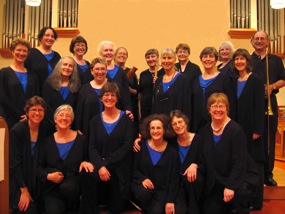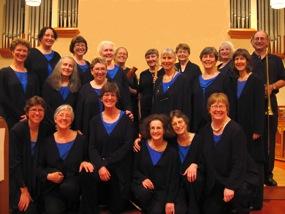
“At the California Missions in the 18th century,” said Cindy Beitmen, founder and director of the 14-voice Women’s Antique Vocal Ensemble (WAVE), “in the middle of nowhere, you’d find music. Earlier, it was known that in the cathedrals of Mexico City and Pueblo, there was polyphonic music better than in Europe. There was a mix of creole, mestizo, and black musicians. The Spanish had decimated the musical traditions of the Indians. Composers came from Spain to the New World and taught, and the Indians latched onto the European polyphonic tradition quickly. In some regions, there were 50 or 60 different Indian languages. The music was the only language in common when they were brought together.”
WAVE is kicking off a series of benefit concerts at several California Missions, to aid in the continuing restoration of the historic buildings. The first concert will be on June 6 at Saint Albert’s Priory Chapel, where Beitmen is music director — a non-Mission venue — followed by concerts Friday, June 10, at the Carmel Mission Basilica; Saturday, June 11, at Mission Santa Cruz; and an unusual performance (also free) Sunday, June 12, as part of the 11 a.m. Mass at the remarkable Mission San Antonio, southwest of King City. The latter Mission provides the only setting that closely resembles the terrain of Spanish California days, and the concert there will be followed by a procession out of the church with WAVE to the Mission’s fiesta that afternoon.
(In September and October, concerts will be given at Mission San José, Mission Dolores in San Francisco, and Mission San Rafael in Marin.)
The procession at Mission San Antonio will feature Hanacpachap cuicuinin, from what’s thought to be the first piece of polyphonic music published in the New World, called Ritual Formulario (from Cuzco, Peru, dated 1631), which was compiled by a Franciscan who ministered to the Incas. In their Imperial language, Quechua, it was originally directed to the Incan cosmic mother figure, Pachamama, which the Church then equated with the Virgin Mother, leaving the Quechua words intact. “We’ll be using a rainstick I’ve got and a big djembi drum from Kenya in the procession,” said Beitmen. (The piece will also be performed at all the other concerts.)
Much of the music for the concerts comes from Musica Colonial Archive, a 10,000-page cache of 16th- through 18th-century manuscripts, some in fragmentary form, “not uncovered until 1976, after the earthquake in Guatemala. Musicians and composers from Spain would come first to the cathedral in Guatemala City, then try to go to Pueblo and Mexico City to make money.” Beitmen also commented on “a big box of original manuscripts found in a mission in Bolivia, marked ‘Toilet Paper’ on the outside.... There’s a lot of stuff yet to be uncovered, all over Latin America. Musically, it really was an exciting time. I’m a trained musician, and I hadn’t heard of any of this.”
The Musica Colonial Archive includes some compositions by well-known Spanish composers — such as Cristobal de Morales, considered to be as influential as Tomas Luis de Victoria and Francisco Guerrero — which have no other known source. Besides Morales, Victoria, and Guerrero, other 16th- and 17th-century Spanish and Italian composers represented in the first part of the program are Giovanni Pierluigi da Palestrina, Gregorio Allegri, Sebastian Duron, and José Torres Martinez Bravo. The second part focuses on composers who emigrated to the New World and composers born there: Francis Lopez Capillas, Francisco Escalada, Hernando Franco, Juan Gutierrez de Padilla, Juan García de Zespedes, and Juan Araujo.
WAVE concerts, Beitmen remarked, have always “promoted early music that women were involved in,” as women of the various races and cultures in Latin America were in women’s choirs, not to mention nuns and novices in convents “who obviously played and sang some music.” She remarked that the idea for the Mission concerts had come to her seven years ago, “then went dormant for a while — our ‘Traditions’ concert had Latin music in it some years ago — but it’s coming together now because we have the right people.” Guest musicians include Joyce Johnson-Hamilton, on cornet and trumpet; Howard Kadis, archlute and vihuela; and Shirley Hunt, Mary Prout, and Aaron Westman, violin and viola.
“We really love Renaissance and Baroque music,” Beitmen concluded, “and having fun making music and helping others. We’ve performed at senior centers, at hospitals, and at Santa Rita Prison. This will be our first tour in 11 years together. The program will go from Masses to motets, villancicos, all forms of hymns, somber polyphonic music to later mixtures of counterpoint with African rhythms — crazy creole and mixed-race stuff: a very entertaining concert!”

